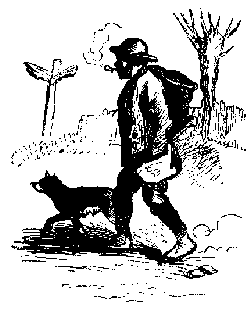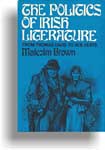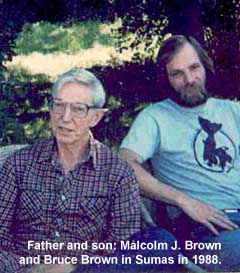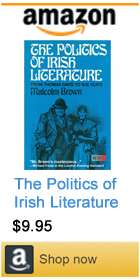Chapter Fifteen
The Ballot Box Once More: Isaac Butt
OF ALL THE GRAND episodes of nineteenth-century Irish history, none has been so intensely studied as Home Rule. It was, to be sure, a vast, intricate, and decisive affair. But it was not a new tune, just a variation on the old one. It arose out of the same generalized causes that had brought out a million men to Tara of the Kings. And it sank on the same rock that had wrecked all the previous experiments in the Whig alliance, and that would in due time wreck the last such experiment in John Redmond's alliance with Herbert Asquith.
When Fenianism was in its green youth back in the time of the MacManus funeral, Lord Carlisle was sent over to hold court in the Viceregal Lodge. Belfast was by then the foremost industrial city of Ireland. The huge new shipyard had added a counterbalance of heavy industry to its prosperous light industry in textiles. The middle classes of Dublin, Limerick, and "Rebel Cork" longed excruciatingly for Belfast's good fortune. Said Lord Carlisle, not a chance; except in Ulster, Ireland's true purpose was to be "the fruitful mother of flocks and herds" or as we would now say, to be "bullock-befriending":
- Here we find in the soil and the climate the conditions best suited for pasture. Hence it appears that cattle above all things seem to be the most appropriate stock for Ireland, and the laws of the market to which I refer agree in recommending the source of supply. Corn, you well know, can be brought from one country to another, from a great distance, at rather small freight. It is not so with cattle-hence the great hives of industry in England and Scotland can draw their shiploads of corn from more southern climates, but they must...
have a constant dependence on Ireland for an abundant supply of meat. . . . He reminded his listeners of those unsightly mud-walled cabins that were formerly to be seen everywhere in Ireland; eyesores really, they had been "the censure and opprobrium of the country" and the particular condemnation "of commercial travellers." They were, further, a source of constant pain to "those public spirited inhabitants who mourned over a state of things which they were unable, at all events, at once to relieve." Well, he would beg to point out that the census of 1841 had enumerated 491,000 of these cabins, but twenty years later, thanks to the reign of economic progress under the Union, the number had fallen to 125,000. Therefore, he said, "with reference to the general concerns of Ireland, I feel I am justified in speaking to you, upon the whole, in terms of congratulations and hopefulness."'
Glory be for the vanished cabin and the great Irish exodus, for the American wake and the emigrant ship, whose pathos was formulated in numerable expressions in the popular culture and treated as a serious literary theme by George Moore, Liam O'Flaherty, and others. Joyce was later to classify these expressions as sentimentalisms:
- I love my country-by herrings I do!
- I wish you could see what tears I weep
- When I think of the emigrant train or ship.
But the lice in Stephen Dedalus' collar and those dreary periodic episodes with the moving van in the Dedalus household-the national "paralysis" for which Joyce was an expert witness-were merely the symptoms of a nation fleeing overseas. O'Leary estimated that Dublin had four hundred barristers but work enough to keep forty of them occupied, and why was this? In 1867 the lord mayor of Dublin tied these threads together: "Emigration is the hemorrhage which drains the life-blood of Ireland away."
II
The executions in Manchester brought the heroic phase of Fenianism to a close. With the organization dismembered and the leaders in jail, systematic action gave place to private adventure. A garrisoned Martello tower near Cork was successfully raided for arms, and several gunsmith shops were cleaned out to the bare walls by Fenians who arrived with primed pistols and large canvas bags to carry off the inventory. During one of these raids a Cincinnati Fenian named William Lomasney was apprehended by a plainclothes detective. As the two men struggled for a revolver, it discharged, giving the officer a nasty leg wound from which he died a week later. Lomasney was tried for murder, but the jury found him not guilty, a verdict that reflected painfully back upon the moral import of the Manchester hangings.
These adventures took on an increasingly frenzied and degenerate mien. A sensational episode in the new style occurred just three weeks after the Manchester hangings. Following the rescue of Kelly and Deasy at Manchester, Colonel Burke himself was soon arrested. He was confined in Clerkenwell House of Detention in mid-London, together with another Fenian, Joseph Casey, Stephens' cousin. A group of London Fenians reasoned that the rescuer ought to be rescued and decided to blast a breach in the jail wall that separated the street outside from the prisoners' exercise yard. The explosion was to be timed for the daily exercise period, when the prisoners were gathered on the opposite side. An informer notified the police that some sort of attempt at rescue would be made, so that Burke and Casey were moved to another part of the jail. The rescuers brought up their explosive in a handcart and in leisurely fashion, watched by idle residents in the nearby houses, they put it in place beside the wall, attached the fuse, lit it, and strolled away. The expert in charge of the operation was said to have been a veteran sapper from the Union army, and no one has ever explained why he used five hundred pounds of black powder, twentyfold too much for the job. The explosion blew out nearly two hundred feet of brick wall and hurled forty tons of masonry across the exercise yard. It would have killed Burke and Casey if they had been there. It shattered every window in the jail, and across the street it demolished a block of tenements, killing twelve persons and maiming a hundred and twenty others...
|
|
Table of Contents
|

|
Astonisher.com is pleased to offer these excerpts from The Politics of Irish Literature by Malcolm Brown...
Praise for
The Politics of Irish Literature |
 |
|
"This brilliant study of the intersection of politics and literature in Ireland amounts to a dazzling portrait gallery. Reading it one feels about one the breath, warmth, and passions of the dead all come alive again."
-- Sean O'Faolain in the Manchester Guardian
"Mr. Brown's masterpiece has made me want to hire a nearby housetop and recite whole chunks to every passerby..."
-- Michael Foote in the London Evening Standard
"The author of the best book on George Moore now gives us what is in all likelihood the best book on the politics of modern Irish literature."
-- Virginia Quarterly Review
|
|

University of Washington Professor Malcolm J. Brown (1910 - 1992) with his son, Bruce Brown, in Sumas, WA, July 1988.
|
Additional reading -- Malcolm Brown's George Moore: A Reconsideration. Also see Bruce Brown's commentary on The History of the Corporation for Malcolm Brown's contribution to that work.
|
|
|






